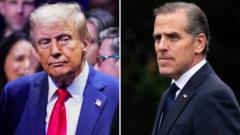Despite widely differing political views, recent events have drawn unexpected parallels between President Joe Biden and former President Donald Trump regarding their legal challenges. Both figures have framed their situations as reflections of a politicized judicial system, igniting support and outrage from different sides of the political spectrum.
In a bold move, President Biden announced a "full and unconditional" pardon for his son, Hunter Biden, describing the prosecution as grossly unfair and politically motivated. “No reasonable person who looks at the facts of Hunter’s cases can reach any other conclusion than Hunter was singled out only because he is my son – and that is wrong,” Biden stated.
This rhetoric echoes Trump’s longstanding claims of political bias in his multiple legal battles, notably the hush-money case in New York related to payments made during the 2016 election. Trump has consistently referred to these proceedings as a "witch hunt." Republican Senator Lindsey Graham, a known Trump ally, criticized the legal actions against the former president as "selective prosecution for political purposes."
Both Biden and Trump are entangled in significant legal affairs spotlighted during the contentious 2024 election year. Hunter's ongoing cases, stemming from actions between 2016 and 2019, parallel Trump's own legal quagmire involving campaign finance violations and business record falsifications. The timing is striking, with both cases emerging after years of investigations.
Critics of the judicial process point out that both cases have seen unusual applications of the law. The Trump case's federal implications and the Biden case's focus on a unique interpretation of gun laws have led both sides to leverage these points for political advantage. Trump's legal team has, in fact, drawn attention to Biden’s pardon, arguing that Biden himself acknowledges a miscarriage of justice, further complicating the narrative.
However, considerable differences exist between the two cases. Hunter Biden has never held a political office, while Trump’s legal troubles are compounded by being embroiled in multiple serious allegations. Yet, both have aroused suspicions of unfair treatment within the justice system.
According to legal experts, claims of political motives influencing prosecutorial decisions often misrepresent the judiciary's workings. The reality is complex, with a plethora of laws leading to selective enforcement. Many societal and structural factors can foster a belief in a double standard, particularly in cases involving political figures or their families.
The implications of these cases go beyond individual accountability. Hunter Biden's pardon spares him from criminal punishment, while Trump navigates a charged political atmosphere that may shield him from repercussions. Public skepticism towards justice practices appears to be validated as citizens witness prominent figures facing, or evading, legal consequences.
This dynamic has stoked the fire of distrust in governmental institutions, as theorized by political experts. As calls for reform grow, both Biden and Trump find themselves entwined in a larger existential crisis facing American democracy and faith in governance.
In summary, the legal entanglements of both Joe Biden and Donald Trump encapsulate a broader narrative of perceived injustice within political circles, suggesting a persistent divide in American society as it wrestles with its leaders' credibility and governance.
In a bold move, President Biden announced a "full and unconditional" pardon for his son, Hunter Biden, describing the prosecution as grossly unfair and politically motivated. “No reasonable person who looks at the facts of Hunter’s cases can reach any other conclusion than Hunter was singled out only because he is my son – and that is wrong,” Biden stated.
This rhetoric echoes Trump’s longstanding claims of political bias in his multiple legal battles, notably the hush-money case in New York related to payments made during the 2016 election. Trump has consistently referred to these proceedings as a "witch hunt." Republican Senator Lindsey Graham, a known Trump ally, criticized the legal actions against the former president as "selective prosecution for political purposes."
Both Biden and Trump are entangled in significant legal affairs spotlighted during the contentious 2024 election year. Hunter's ongoing cases, stemming from actions between 2016 and 2019, parallel Trump's own legal quagmire involving campaign finance violations and business record falsifications. The timing is striking, with both cases emerging after years of investigations.
Critics of the judicial process point out that both cases have seen unusual applications of the law. The Trump case's federal implications and the Biden case's focus on a unique interpretation of gun laws have led both sides to leverage these points for political advantage. Trump's legal team has, in fact, drawn attention to Biden’s pardon, arguing that Biden himself acknowledges a miscarriage of justice, further complicating the narrative.
However, considerable differences exist between the two cases. Hunter Biden has never held a political office, while Trump’s legal troubles are compounded by being embroiled in multiple serious allegations. Yet, both have aroused suspicions of unfair treatment within the justice system.
According to legal experts, claims of political motives influencing prosecutorial decisions often misrepresent the judiciary's workings. The reality is complex, with a plethora of laws leading to selective enforcement. Many societal and structural factors can foster a belief in a double standard, particularly in cases involving political figures or their families.
The implications of these cases go beyond individual accountability. Hunter Biden's pardon spares him from criminal punishment, while Trump navigates a charged political atmosphere that may shield him from repercussions. Public skepticism towards justice practices appears to be validated as citizens witness prominent figures facing, or evading, legal consequences.
This dynamic has stoked the fire of distrust in governmental institutions, as theorized by political experts. As calls for reform grow, both Biden and Trump find themselves entwined in a larger existential crisis facing American democracy and faith in governance.
In summary, the legal entanglements of both Joe Biden and Donald Trump encapsulate a broader narrative of perceived injustice within political circles, suggesting a persistent divide in American society as it wrestles with its leaders' credibility and governance.





















